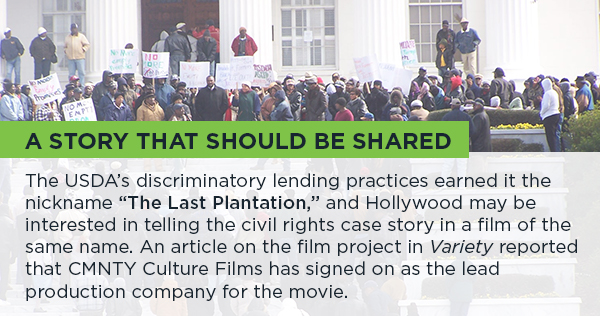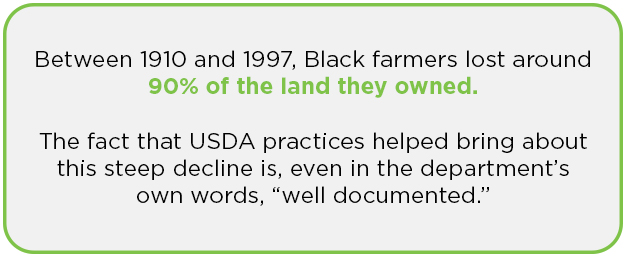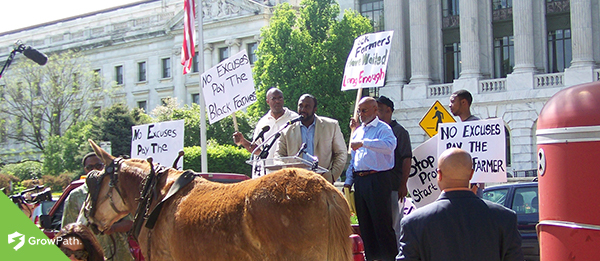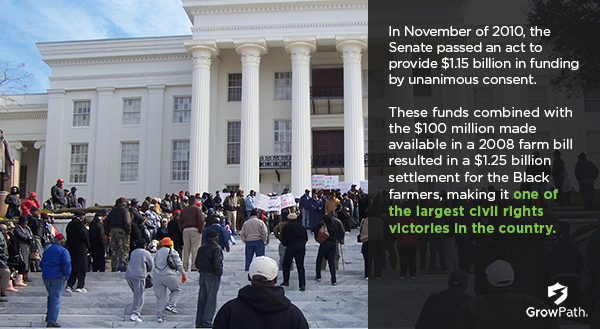$1.25 Billion Settlement for Black Farmers
GrowPath’s origins are tied to a historic and meaningful event – one of the largest civil rights cases in U.S. history.
Many of our leadership team once led In re: Black Farmers Discrimination, a $1.25 billion settlement for Black farmers after years of egregious discrimination by the United States Department of Agriculture (USDA). One of our founders was instrumental in overcoming the significant logistical roadblock involving the claims process – one that had hampered efforts in the predecessor case (Pigford v. Glickman).
Determined to take care of the farmers who had suffered at the hands of USDA, GrowPath’s co-founder developed algorithms and technology and oversaw numerous teams across the U.S. to make sure that every one of the 100,000 potential claimants was given a chance to sit knee-to-knee with an attorney and file their claim – all in a six month timeframe.
It was unprecedented work. And in addition to providing some measure of justice for the Black farmers who had so much taken from them – it paved the way for many of the tools you see in GrowPath today.
This is that story.

Check out the Variety article on The Last Plantation.
Black Farmers Claim Discrimination
In 1997, a Black farmer in North Carolina named Timothy Pigford filed a class action discrimination lawsuit against the federal government alleging a pattern of racism that kept Black farmers out of USDA loan and assistance programs.
The discrimination against Black farmers cited in the lawsuit (commonly known as Pigford I) included:
- Denying Black farmers’ loan requests
- Delaying Black farmers’ loan requests until the end of planting season
- Denying crop disaster payments to Black farmers

In 1999, the government awarded the Black farmers
$1 billion, but the victory was incomplete. Due to mismanagement and poor communication, an additional 70,000+ Black farmers were not notified in a timely manner of the process for joining the class action suit, and their late claims were denied. An additional $100 million was set aside for the farmers in a 2008 farm bill, but it was evident that this amount was insufficient to cover the valid claims of many more Black farmers against the USDA.

A Second Chance for Black Farmers
A second class action suit (In re Black Farmers Discrimination Litigation, but also commonly referred to as Pigford II) was started to help the Black farmers who were left out of the first claims process. The Law Offices of James Scott Farrin became the lead driver for a team of 25+ firms on the case, and one of our co-founders was chosen to serve as Class Counsel’s point person for issues including data analysis, technology, and client communications.
In February of 2010, the Department of Justice and USDA approved a settlement of $1.25 billion for the Black farmers. However, there was a caveat: Congress had to approve the $1.15 billion in funds above and beyond the $100 million from the 2008 farm bill.

The Fight for Funding
There was no guarantee that the government would fund the second settlement. Our leadership team worked tirelessly alongside passionate activists, such as John Boyd, Jr., a Black Virginia farmer and founder of the National Black Farmers Association. They organized countless demonstrations and rallies with thousands of Black farmers across the U.S. to motivate Congress and the White House to appropriate the funds.
The black farmer is not asking for a handout, he is asking for a handshake, asking for the same shake and the fair shake that the white farmer gets.
GrowPath Co-Founder
Hard Work Pays Off As Funding Is Approved
After months of negotiating, Congress agreed to do the right thing and fund the settlement. In November of 2010, the Senate passed an act to provide $1.15 billion in funding by unanimous consent. These funds combined with the $100 million made available in a 2008 farm bill resulted in a $1.25 billion settlement for the Black farmers, making it one of the largest civil rights victories in the country.

Claims Submissions Success Story
With the settlement funded, it was time to fgure out how to succeed where the first case fee short. The goal was to help tens of thousands of victimized Black farmers across the U.S. submit their claims in the allotted 180 day timeframe. Existing software tools were not going to suffice, so our co-founder created and organized a series of databases and logistical solutions to enable the legal team to meet the deadline. The resulting solution included:
- Analyzing data to determine locations that would offer almost everyone a meeting within an hour’s drive
- Organizing nearly 400 meetings with potential claimants across 23 states and Washington, D.C.
- Contracting with and training teams of attorneys and paralegals across the nation
- Meeting with nearly 22,000 Black farmers in person to assist them in submitting their claims
- Creating and managing a phone bank for those farmers who could not attend one of the meetings
United States District Judge Paul L. Friedman recognized these efforts and stated in his opinion on the case, “Class counsel have undertaken the immense challenge presented by this action with the utmost professionalism and integrity, exhibiting skill, diligence, and efficiency in all aspects of their duties.”
We were determined to ensure that these farmers were not let down again, and we gave them the chance to finally have their claims heard and answered.
GrowPath Is Born
After tackling the challenges of managing the tens of thousands of Pigford II claims, our co-founder turned his operational and systems know-how towards building GrowPath, a full-featured legal case management system that helps lawyers serve clients more efficiently and achieve faster results.
GrowPath was built to address real-world problems, and that’s what we continue to be about.
GrowPath has 30+ patents in the areas of cybersecurity, email routing, enhanced client lead scoring, search, and more, and we are committed to developing and adding new functionality to it. Every day, our team is thinking of new ways to help law firms overcome the issues they face.